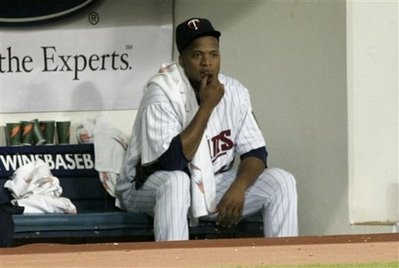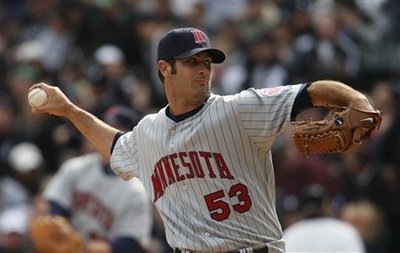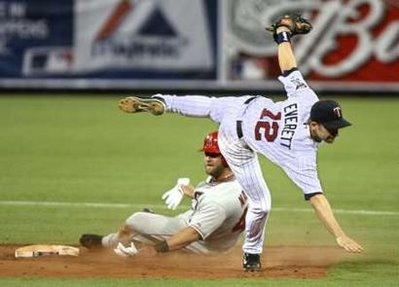April 20, 2008
Twins Notes: Liriano, Blackburn, Everett, and Morneau
Liriano had a career-high five walks in his first start and matched that total Friday, throwing just 47 of 88 pitches for strikes. He got Grady Sizemore to swing through a two-strike slider to lead off the game, but struck out just two of the next 21 batters and uncharacteristically induced more fly balls than grounders. Liriano showed Friday that he should be capable of pitching effectively once his command settles in, but he remains nowhere close to regaining the stuff that dominated the league in 2006.
 With that said, even limited improvement can be viewed as a major positive at this point, even if Liriano didn't seem very pleased with his second outing. "I'm rushing too much with my fastball, trying to make a perfect pitch, and it's not working that way," Liriano said. "I've just got to calm down and get better, hit my spots with the fastball." Predictably, Ron Gardenhire had a slightly more optimistic view of Liriano's performance:
With that said, even limited improvement can be viewed as a major positive at this point, even if Liriano didn't seem very pleased with his second outing. "I'm rushing too much with my fastball, trying to make a perfect pitch, and it's not working that way," Liriano said. "I've just got to calm down and get better, hit my spots with the fastball." Predictably, Ron Gardenhire had a slightly more optimistic view of Liriano's performance:
Frankie was better than last time. He's still not commanding his fastball and the strike zone in general. The arm's there, the velocity's there. He had some spurts where it really came out of his hand and it looked really good, but he was still missing the zone a little too much. It was a step forward. It's just about the fastball now, throwing it in the zone.
Gardenhire saying that "the velocity is there" seems odd given that Liriano frequently failed to crack 90 miles per hour, but at this point the Twins seem pleased that he's simply able to throw an MLB-caliber fastball even if it's not close to a Liriano-caliber fastball. "There's still enough jump on his fastball, enough life at the end, that he doesn't have to pitch to spots," pitching coach Rick Anderson said. "He just has to pitch to an area." Liriano's next start will come Thursday against the ever-patient A's.
Blackburn racked up 11 strikeouts through his first two starts, which was completely out of character based on his minor-league track record, but has gotten into character by totaling one strikeout in two starts since. He's made up for the lack of missed bats by inducing 26 ground-ball outs over that stretch and has induced a grounder on 55.3 percent of his balls in play overall. Unlike some low-strikeout pitchers who experience immediate success, Blackburn hasn't gotten lucky on balls in play.
The defense behind him has actually converted balls in play into outs at a slightly below-average rate and because of that his .289 opponent's batting average is sub par. He's limited the damage of those hits by serving up zero homers and handing out just three walks in 103 plate appearances. Blackburn allowed eight hits Saturday against the Indians, but didn't issue a walk, kept the ball in the ballpark, and wriggled out of trouble repeatedly by coaxing four double plays.
 It was an outing straight from the Carlos Silva tight-rope walking handbook. Blackburn issued just 19 free passes in 148.2 innings between Double-A and Triple-A last season, so his control is legitimately outstanding. A dozen strikeouts in 25.1 innings is also about what should be expected based on his track record. In other words, he'll keep pounding the strike zone and pitching to contact, which leaves Blackburn's ground-ball and home-run rates as the big variables.
It was an outing straight from the Carlos Silva tight-rope walking handbook. Blackburn issued just 19 free passes in 148.2 innings between Double-A and Triple-A last season, so his control is legitimately outstanding. A dozen strikeouts in 25.1 innings is also about what should be expected based on his track record. In other words, he'll keep pounding the strike zone and pitching to contact, which leaves Blackburn's ground-ball and home-run rates as the big variables.
Inducing 55 percent grounders all year would make him one of the most ground-ball heavy pitchers in baseball and give him a strong chance for continued success, but his ground-ball rate was 50 percent in the minors over the past two seasons and facing MLB hitters tends to equal more fly balls. It seems unlikely that Blackburn can continue to induce so many grounders and either way he'll eventually serve up some homers, but he's certainly been impressive enough to make me look silly thus far.
Everett's throwing problems now make sense after the Twins placed him on the disabled list Saturday afternoon with right shoulder tendinitis. Everett called the shoulder injury "a little shocking" because he's never experienced previous arm problems while starting for the Astros over the past five seasons, adding: "I don't feel like anybody's seen me really play yet because I don't feel like I've been 100 percent healthy, so maybe I can get back and show you guys that I can actually play the shortstop position."
 With Everett heading the DL the Twins called up Brian Buscher from Triple-A to replace him on the roster, which is well deserved given that he was batting .345/.397/.586 in 15 games at Rochester this season after hitting a combined .309/.385/.493 in 103 games between Double-A and Triple-A last year. Buscher would normally be somewhat superfluous and highly unlikely to get significant playing time, because third base, first base, and designated hitter are all manned by left-handed hitters.
With Everett heading the DL the Twins called up Brian Buscher from Triple-A to replace him on the roster, which is well deserved given that he was batting .345/.397/.586 in 15 games at Rochester this season after hitting a combined .309/.385/.493 in 103 games between Double-A and Triple-A last year. Buscher would normally be somewhat superfluous and highly unlikely to get significant playing time, because third base, first base, and designated hitter are all manned by left-handed hitters.
However, until Michael Cuddyer comes back from his dislocated finger Gardenhire will have the option of opening up the DH spot for Buscher by playing Kubel in right field and benching Denard Span. That alignment was suggested in this space when Cuddyer headed to the DL two weeks ago and seems like an obvious move to make for a team struggling to score runs, but not starting the light-hitting Span in right field to begin with once seemed plenty obvious too.
In fact, Tolbert has surprisingly already started three games at shortstop this month while Punto played third base. That's telling, because for all the talk among fans and the media about Punto's supposedly great defense, the Twins have been willing to stick him at the position where they typically start Mike Lamb and his poor defensive reputation while a rookie plays shortstop after starting just eight games there in the minors last season.
Either Gardenhire has some odd theory about infield defense that involves playing Punto at third base while the middle infield is manned by a pair of inferior gloves or he simply doesn't actually agree with the portrayal of Punto as a great defender. Whatever the case, Tolbert will likely see plenty of action at shortstop as long as he continues hitting well. Of course, Tolbert's bat figures to slow down soon given his .280/.345/.405 career hitting line in over 1,500 minor-league plate appearances.
Once Tolbert's bat comes crashing back down to earth the Twins may begin to more clearly see him as something less than an asset defensively at shortstop, in which case Punto would be in line for increased playing time. Punto, Tolbert, and Harris are the only middle infielders on the major-league roster and the only legitimate shortstop options at Triple-A right now are Alexi Casilla and Chris Basak (and Tommy Watkins, if you're really feeling generous defensively).
In case you're curious, Jason Bartlett is hitting just .210/.234/.242 in 17 games and has already made four errors--including a huge one against the Twins last week--as the Rays' starting shortstop.
Once you're done here, check out my latest "Daily Dose" column over at Rotoworld.

